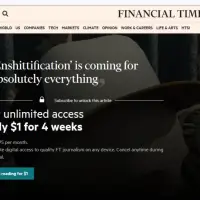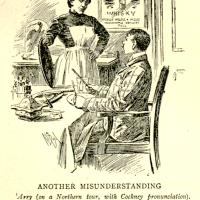Behind C.S. Lewis’ famous Narnian chronicles was his experience as a teacher of English literature, a writer about the history of literary movements, and a tinker in other forms of fiction. In that tinkering, and in his letters and essays, he would sometimes create new turns of phrase when it was needed. This is the ninth in the series on words that C.S. Lewis coined. The previous two posts (Disredemption and Viricidal) were a little dark; hopefully this week’s sketch lightens things up a week.
 It was the Unblank button that did me in. I was setting up my slides for a lecture and looked down at the new tech set up. Among the buttons that control the project was the “Blank” screen button and–wait for it–its logical opposite: Unblank. Really? That’s the best they could do? This seems to me to be a repeat of the “The Door is Ajar” silliness of talking cars in the 80s.
It was the Unblank button that did me in. I was setting up my slides for a lecture and looked down at the new tech set up. Among the buttons that control the project was the “Blank” screen button and–wait for it–its logical opposite: Unblank. Really? That’s the best they could do? This seems to me to be a repeat of the “The Door is Ajar” silliness of talking cars in the 80s.
But the tradition of throwing words onto the beginning or end a word is a long and dis/honourable one. Some of these stick with us, like dysfunctional or mistake. Others have disappeared, like the peculiar forms unabandoned, unabsoiled, unabsolute, unabsolved, unabuilyeit, disabridge, and disafforest. Others change form over time, so that we still say “unable” but the word “unability” has become “inability” and “unablety” has become “disability.” Other verbicidal forms we wish would disappear, like all the prefixes and suffixes attached to “truth” these days. Many of these words are unaccounted for because we forget they are prefixes at all (like the “a” in “unaccounted”).
Here are some of C.S. Lewis’ humorous–if not terribly elegant–uses of prefixes and suffixes to make his point in a new and interesting way.
Unvalue
 I suspect many have said the word “unvalued” in the adjectival form to mean something or someone who is not properly valued. John Bail in vol. 1 of his 1551 treatise with the snappy title, The first two parts of the Actes, or vnchast examples of the Englysh votaryes, uses it as a verb: “in hys mouthe myght vnualue or dysable their masses.”
I suspect many have said the word “unvalued” in the adjectival form to mean something or someone who is not properly valued. John Bail in vol. 1 of his 1551 treatise with the snappy title, The first two parts of the Actes, or vnchast examples of the Englysh votaryes, uses it as a verb: “in hys mouthe myght vnualue or dysable their masses.”
Lewis, though, tried to use “unvalue” as a noun. It is in his dialogue with philosopher C.E.M. Joad on “The Pains of Animals” that Lewis suggests that a single instance of pain where there is no accompanying fear or reflection on the pain is, from the point of view of the one who experiences the pain, essentially not pain, but a sensation. “Unvalue” may have been a good rhetorical invention for the purpose, but in this context it simply means “nil value,” so just a variation of “value” rather than its opposite. The noun in a better sense was attempted by John Ruskin in an obscure Daily Telegraph piece of 1864, “Intrinsic value or goodness in some things, and … intrinsic unvalue or badness in other things.” Still, not a terribly elegant word.
In any case, Lewis was not alone in reaching for this word, though doubtless he thought he was. Though rare, the word “unvalue” is actually attested in two kinds of 20th century literature: philosophy books that no one reads and tax surveys that no one should read. Exciting stuff.
While Lewis found most of his made-up words were inelegant–and in some cases we’d agree– he liked this one. While Lewis coined “letterlessness” in a letter to his father on Mar 1st, 1917, to capture the (for him, blissful) state of not having any letters he had to write, the adjective “letterless” was already in play for a long time. “Letterless” meant “unlettered” or illiterate in the earliest 16th and 17th centuries. It took on a more tactile sense later, even referring to an unmarked grave in the 18th century. By this time it was also being used for the person who has no letters to receive or write, and Lewis uses it himself as a teenager.
Still, we know how much Lewis detested letter writing: “it is an essential of the happy life that a man would have almost no mail and never dread the postman’s knock” (Surprised by Joy 143). I wish for him that the afterlife is some state of letterlessness–though few of us hope that heaven is letterless in the Renaissance sense of the word.
Antiparody
 Lewis had a way of looking at things upside down. This is the G.K. Chesterton in him, though I suspect that he comes by the trait honestly. David Mark Purdy has argued in Both Sides of the Wardrobe (edited by Rob Fennell)–and I think argued correctly–that The Screwtape Letters is not a parody or satire exactly, but an inverted parody or inverted satire. This “double inversion” gives Screwtape it’s peculiar disorienting and bracing quality.
Lewis had a way of looking at things upside down. This is the G.K. Chesterton in him, though I suspect that he comes by the trait honestly. David Mark Purdy has argued in Both Sides of the Wardrobe (edited by Rob Fennell)–and I think argued correctly–that The Screwtape Letters is not a parody or satire exactly, but an inverted parody or inverted satire. This “double inversion” gives Screwtape it’s peculiar disorienting and bracing quality.
This isn’t the only time that Lewis tried to think in terms of double inversion. In English Literature in the Sixteenth Century he coined “antiparody” as an academic word to describe a certain kind of phenomenon:
“The excellent lyric ‘All my lufe leif me not’ … belongs to a large class [of] … ‘antiparodies’ (if I may coin a most necessary word): the conversion of popular and secular songs to devout purposes” (English Literature in the Sixteenth Century 112).
Lewis makes the observation that there is a feature of Medieval and early Renaissance poetry that converts popular and secular songs to devout purposes, such as a hymn or sacred poetry. Thus it is a kind of parody, but lacking the humour or mocking tone altogether. These folks songs will go on to make up some of the early Protestant hymns and the poetic books that the Puritans read, and began as parodies and drinking songs—and often with bawdy content. While the word is thrown about academic circles these days and means something different, Lewis enjoyed the subversive nature of this inversion that took up the popular poem and made it religious.
In 5 Dec 1949 letter to American correspondent Dr. Warfield M. Firor, Lewis wrote:
“I don’t think ‘incomprehensible’ in the Creed or ‘passing comprehension’ [Phil 4:7] mean what is usually thought. It doesn’t mean, I am told, simply unintelligible, like a book in an unknown tongue. It means not thinkable-out, not capable of being fully summed up or intellectually mastered).”
Here Lewis uses “not thinkable-out” as a nonce word to show the difference between something that is incomprehensible in the way we use that word today, and something that is indescribable (in its various uses). A more elegant usage would be “not think-out-able”–but that grammar break may have stretched him too much. Like the concept Lewis was trying to describe, sometimes words are elusive.
Resnuggle
 We have already seen that Lewis played with words in his children’s works, though I had missed some of the tradition of those words when I wrote the piece. “Re-snuggled” might have occurred in literature before Lewis, but I cannot find it. Neither is it necessary to reach very far to imagine the concept. I bet no kid reading the sentence in which it occurred ever had doubts.
We have already seen that Lewis played with words in his children’s works, though I had missed some of the tradition of those words when I wrote the piece. “Re-snuggled” might have occurred in literature before Lewis, but I cannot find it. Neither is it necessary to reach very far to imagine the concept. I bet no kid reading the sentence in which it occurred ever had doubts.
Here is the passage from the Narnian prequel, The Magician’s Nephew:
“Fledge trotted to and fro, sniffing and whinnying. The children tip-toed this way and that, looking behind every bush and tree. They kept on thinking they saw things, and there was one time when Polly was perfectly certain she had seen-a tall, dark figure gliding quickly away in a westerly direction. But they caught nothing and in the end Fledge lay down again and the children re-snuggled (if that is the right word) under his wings. They went to sleep at once” (The Magician’s Nephew ch. 12).
The words “snug” and “snuggle” have an almost onomatopoeia quality to them, don’t they? To snuggle in is an important activity, and perhaps deserves to have been put in the “re-” category a long time ago. Alas, this word hasn’t been taken up, which is true of almost none of Lewis’ neologisms and borrowed nonce words.
- Part 1 and Introduction: Bulverism
- Part 2: Charientocracy
- Part 3: Rebunker
- Part 4: Jollification, Uglification, and the Miserific Vision
- Part 5: Grailologist
- Part 6: Curialisation
- Part 7: Viricidal
- Part 8: Disredemption
- Part 9: Re/Anti/Un/Ness

























Pingback: The Words C.S. Lewis Made Up: Aristocratophobia and Lowerarchy | A Pilgrim in Narnia
Pingback: C.S. Lewis, Sexology, and the OED | A Pilgrim in Narnia